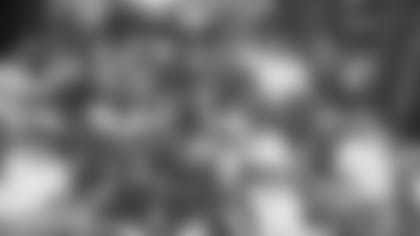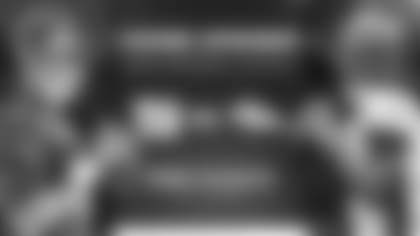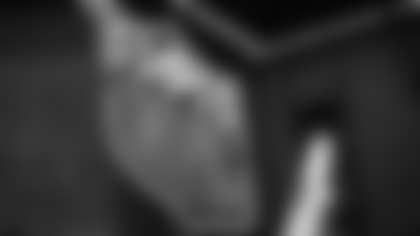EAST RUTHERFORD, N.J. – Amani Toomer didn't have to turn on his television to watch the Twin Towers fall on 9/11. He could see them from his bedroom.
"I saw both kind of shrink into the skyline from my apartment," Toomer said this week. "I was thinking there's going to be helicopters to take people off the roof. Then, to see them fall, I couldn't believe it because of the enormity of those two buildings."
Twenty years later, the sight of seeing the north and south towers of the World Trade Center crumble to the ground remains unfathomable to millions of people.
It is the 20th anniversary of the 9/11 terrorist attacks. On Sunday, the Giants will remember that terrible day when they host the Denver Broncos in their season opener in MetLife Stadium. The team will host first responders, including members of the Wounded Warrior Project, a charity and veterans service organization that offers a variety of programs, services and events for wounded veterans. The Giants will also host Tuesday's Children, a non-profit organization that was formed in the aftermath of Tuesday, Sept. 11, 2001, to support families who lost a loved one. Both groups will be participating in on-field activities during pregame and halftime along with other First Responders. The Giants players and coaches will wear special hats to honor The New York City Police Department, New York City Fire Department and Port Authority Police Department. The Giants coaches will wear 9/11 pins.
The Giants have always been closely intertwined with the tragedy of 9/11. They could see the towers from their practice field outside Giants Stadium. The Giants played in Denver the night before the attacks and when they arrived at Newark Airport the following morning, their plane was gated right next to one that would soon be hijacked by terrorists and later crash in Shanksville, Pa. After the attacks, the Giants organization was immersed in the recovery effort. Less than three weeks later, they welcomed a large group of people who had lost family members to a practice in the stadium. The organization donated money and supplies, sent delegations to lower Manhattan and visited firehouses and police precincts in the city that had lost so many members. The Giants' commitment continues today.
Those who were there can still recall every detail.
"I was living in West New York (N.J.) and I could see the towers from my bedroom because I lived right on the water," Toomer said. "I just remember watching it. I remember I was supposed to go in the city that day and do some shopping. I remember the person I was supposed to meet told me, 'Hey look, we might be a little delayed. There might be a lot of traffic because there's a plane that hit the towers.' I didn't think anything of it. I was like, 'Oh, maybe one of those Cessnas kind of lost control and ran into the tower.' Then she called me a little while later and said, 'The second tower got hit. We're under attack.' I looked out the window, and I saw these two huge buildings, you remember how prominent they were, just smoking. Then, you get the jet fighters flying up and down protecting Manhattan. It was a crazy day. I remember sitting on the couch that day watching T.V. and trying to figure out what was going to happen next. It was a day that put a lot of things in perspective for a lot of people. It definitely changed everything."
"Obviously, it's a tragic time in our country's history and just having been here, the memories are really vivid for me," said Jason Garrett, then the Giants' backup quarterback and now their offensive coordinator. "I can remember so many specific details of the day and certainly the week and the time to follow. It just was a really, really sad time. One of the great takeaways – I actually was talking to (former Giants quarterback) Kerry Collins about this the other night - it was just amazing how this area and our country, in many ways our world, came together after 9/11. I can remember we were living in the city at the time, and I can remember we were going to go donate blood, and literally they said, 'We've had so many people want to donate blood, we do not need any more blood.'
"To us, that was always like this amazing thing, how everybody rallied around the cause after such a tragedy. It was such a sad, emotional time. In many ways, I think we felt fortunate as members of this team to be able to try to help the community in some ways. We spent a lot of time at firehouses and visiting police departments and some of the people who lost their dads or their moms. At least you felt like you were trying to do something, and I thought (vice president of community & corporate relations) Allison Stangeby and everybody here at the Giants did an amazing job connecting us with the community in that regard."
The NFL canceled its games scheduled the weekend after the attacks – they were made up in January – but the teams soon returned to the business of football. Jim Fassel was then the Giants coach and he urged the players to find a new purpose in their work.
"He said, 'What we can do as football players to help this country is to give them something to cheer about, give them something to talk about, give them a couple hours of reprieve from what's going on in the world, just a couple hours,'" Toomer said. "I think that was kind of our mantra the whole year."
"I just thought he did an amazing job," Garrett said of Fassel, who passed away three months ago at the age of 71. "We had a chance to go to the dinner after the golf tournament they had for him (on Aug. 30) and there were a lot of policemen there, firemen there, guys who were around at 9/11 who we stayed in touch with, and a big part of the tribute to him was around his leadership in response to that tragedy. I thought he handled it beautifully and it was great to see his leadership as a player help this organization and help this community."
Those duties are not in a standard coaching training book.
"I don't think it's in anybody's manual," Garrett said. "If we all think about that time, I think everybody – whether it's President (George W.) Bush or the leaders in our country, the community leaders, just citizens – how do you respond to that? One of the things when you reflect back on that time, what was amazing is I think we were at our best in our response and how everyone came together. It wasn't about being liberal or conservative, it was about being an American and it was about being a human being. I thought we did a great job in this area and all across our country rallying around the cause."

Twelve days after the attacks, the Giants returned to competition in Kansas City. Arrowhead Stadium is traditionally one of the NFL's most inhospitable venues for visiting teams. But that day, the fans rose to their feet and cheered constantly for the team from New York. They also passed firefighters' boots through the crowd to collect money for the relief effort in the metropolitan area.
"We got a standing ovation," Toomer said. "I remember everybody telling me how bad Kansas City was, and that was the only time I've ever played in Kansas City, besides the time when I was on the Chiefs for a preseason game. It was weird, because everybody talks about that as a tough place to play, and I remember it being a very friendly place to play."
"I remember going out before the game to warm up and the fans were so warm and welcoming," Garrett said. "It was such an emotional time. I can remember them playing a lot of Bob Dylan before the game and it just seemed like a surreal experience. But the great takeaway was this fanbase in Kansas City that was always so behind their team was certainly behind the Chiefs, but you also felt their support for our team and for people in our area and that was a great takeaway. I think you reflect back on just the national anthem, and I can remember guys were just crying. It was just such an emotional thing and then you had to kind of get your energy right, take a deep breath and go play a football game.
"Personally, for me, I held in that game for the first time, and I can remember the pressure of that. Needing a field goal late in the game and Morten Andersen was our kicker and just making sure, hey, catch it and get it down. This is damn important. Good thing it all worked out. I thought our organization and our team did a great job responding to that time."
The Giants won, 13-3, but the outcome was the least memorable part of the day.
"I didn't realize it would be as emotional as it was," Toomer said. "Everything for the whole two weeks just welled up. (Former Giants wide receiver) Thabiti Davis saluted during the national anthem, and he was crying. I guess I was that young, nothing that real ever really happened. So, when something really real happens, and it basically changed our entire country, it's changed everything, our relations with a lot of different things, and it's like the end of the innocence, I guess, for our country.
"We had guys crying in the locker room, crying when they were doing the national anthem. I remember Bon Jovi singing America the Beautiful at that firehouse in New York City. The last thing I wanted to do was play a football game that day, because it was just such a heavy lift. I remember we won the game, and that was a really exciting feeling. I remember it being a very, very difficult situation."
After the game, the Giants filed into their cramped locker room, where Fassel had the entire team come together. Many coaches wore NYPD and FDNY caps and team photographer Jerry Pinkus took a photo that still resonates two decades later.
"I'll never forget the picture we took after the Kansas City game," Garrett said. "It was an emotional time, and it was an important game for us and somehow, some way we found a way to beat the Chiefs that day. I remember after the game he just brought everybody in and said, 'Just kind of get in the locker room,' and we all kind of just got in this picture and they snapped this picture. We felt a real burden and a responsibility to have success for this area and for the people who were going through such challenging times and I thought that moment captured it where we all kind of came together. It's still one of my favorite pictures I've ever had in football. I have it in my office. I have it at my house. So many distinct memories of that time. Twenty years later, I mean, they're vivid. They're vivid and you can still feel them. Obviously, a very tragic time in our country's history."
The 2001 Giants lived with constant reminders of that dreadful day. Some still do.
"Our team was never the same," Toomer said. "There was one time at practice and one of the alarms went off in the bubble, and the whole team ran out of the bubble. Then, they finally got us back in, and then about 10-20 minutes later, the alarm rang again, and everybody ran out again. Then, coach was like, 'Forget it, let's go, we're done with our practice.' So, we left. Everybody was on pins and needles the whole season. You see the towers from the practice field, so I remember that whole year we were sitting there, and it was a constant reminder. You could smell the towers burning because they burned for like six months after that. You would see them smoldering for the entire season from the practice field.
"Every time I look at the Freedom Tower, though, it's a constant reminder. I remember being so impressed when I first got to New York with the Twin Towers, so impressed. Then, now to see them gone, it's a constant reminder."

Limited Tickets Available for Giants vs. Broncos
Limited tickets are available for the Giants' home opener vs. the Broncos on Sunday






